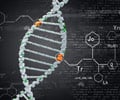The gene mutation responsible for a condition in which eye and brain development is severely disrupted in infants has been discovered by researchers.

The condition is one of the congenital disorders of glycosylation or CDG, a group of syndromes in which inborn metabolic errors result in serious, sometimes fatal, malfunctions of different organ systems, especially the nervous system, muscles and intestines.
The researchers have discovered that the gene SRD5A3 is responsible for the synthesis of a lipid used by cells as a sugar carrier for protein glycosylation in which proteins are modified by the addition of a sugar or sugar chain.
"We found the long-sought polyprenol reductase that has been suspected for decades" said Joseph G. Gleeson of Howard Hughes Medical Institute.
"Using a human genetic approach, we were able to not only find a clue to understand this class of disorder, but also to solve a basic science problem," he added.
"Dolichol is used by the cell like a truck to transport glycans to their destination but also as a support to build them" said Vincent Cantagrel of UC San Diego.
Advertisement
In CDG cases, the conversion from polyprenol to dolichol is blocked by a mutation in the SRD5A3 gene.
Advertisement
Identifying the blockage, Gleeson said, pointed to a possible treatment.
"The key was identifying the enzyme's role in producing dolichol. This is the basic step that is blocked in our patients, and the disease is the result.
"Our idea is that if you feed these patients dolichol, that might just treat the condition. It would be similar to giving insulin to diabetics. It's a simple solution, but one nobody had thought of," he added.
The findings were published in an online journal Cell.
Source-ANI









